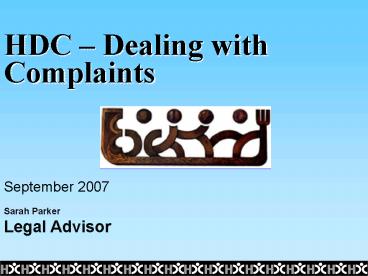HDC Dealing with Complaints - PowerPoint PPT Presentation
1 / 28
Title:
HDC Dealing with Complaints
Description:
... P(PPPxP PPaP P(P((PP(Px(P (P(Pa(P (PPP(PPPPPxPP PPPPaPP PPxP(xPPxPxxP xPxPaxP ... a ( P x a a (a Pa xa a a aa a ( P x a ( P x a ( (( P ... – PowerPoint PPT presentation
Number of Views:299
Avg rating:3.0/5.0
Title: HDC Dealing with Complaints
1
HDC Dealing with Complaints September 2007
Sarah Parker Legal Advisor
2
Overview
- HDC
- HDC and the complaints process
- Tips for resolving complaints
3
Injured patient
Accident Compensation Corporation
Health Commissioner
Complaint resolution
Quality improvement
Compensation
Provider accountability
MALPRACTICE LITIGATION
4
Patient rights in New Zealand
- Respect, dignity,
- non-exploitation
- Appropriate standard
- of care
- Effective communication, sufficient information,
- and consent
- Support
5
Reasonable actions in the circumstances
- Defence for a provider to show he or she took
reasonable actions in the circumstances - Commissioner considers clinical factors and
resource constraints
6
Complaints
- Right 10 Right to Complain
- Every provider must facilitate the fair, simple,
speedy and efficient resolution of complaints
7
What do patientscomplain about?
- Information
- - insufficient or incorrect information
- Communication
- - rudeness, insensitivity, poor timing
- Adverse events
- - wrong diagnosis, wrong management
- Improper conduct
- - sexual or financial exploitation
8
What are they looking for?
- Safer care 51
- - lessons to be learnt
- Communication 41
- - explanation/closure
- Compensation 18
- Punishment 12
9
Purpose of investigating patient complaints
- Individual resolution
- Resolution, not
retribution - Safety and quality improvement Learning, not
lynching - Public protection
- Watchdog role
10
Complaints process at HDC
Complaint
(unless OJ)
Complaints Assessment Triage
Referral to provider or other agencies
Advocacy
Mediation
Investigation
No further action
Breach / No breach report
Re-assessment
11
How HDC handles complaints
12
How HDC handlescomplaints about doctors
456 complaints 57 investigations 22 breach
findings 5 DP referrals 7 disciplinary
hearings
2006/2007
13
Investigation Process
- Notify parties/professional bodies
- Provider responds
- Expert advice sought
- Provisional opinion
- Parties respond
- Final report
14
Systems focus
- The Commissioner has facilitated a
world-leading focus on addressing aspects of the
system which contribute to patient harm, rather
than only seeking to identify individual
scapegoats when things go wrong - Alan Merry Mary Seddon, NZMJ, 21/7/06
15
Eileens Story
- Bright 91-year-old admitted to hospital with
chest infection in April 2002 - Given 5 doses of another patients morphine over
4 days - Eileen/family not told for 3 days
16
Eileens Story
- The delay left us feeling insignificant,
unimportant, with diminished confidence in the
integrity and professionalism of the staff - It also left us extremely angry. Anger is a
driving force in itself. - ... perhaps this anger could have been
effectively defused - daughter
17
Focus on the system
- Organisational circumstances beyond the nurses
control were a factor. A high turnover of nursing
staff at PNH, particularly on medical wards,
meant that nurses were carrying higher workloads
than normal. - As Commissioner, I must balance an ideal
approach to the provision of care against what is
reasonable in the circumstances. - Opinion 03HDC14692
18
Hospital response
- Patient records drug charts in ED
- Recruitment and staff issue addressed
- Education programmes enhanced
- Handover processes improved
- Access to/review of drug charts standardised
- Swipe card system for ward dispensaries
- Patient details in long hand on chart before
label affixed
19
(No Transcript)
20
Communication is key to avoiding complaints
- Doctors who educate patients about what to
expect, encourage patients to talk and check
understanding tend to have fewer formal
complaints than those who do not do these
things. - Levinson, 1997
21
Honesty is the best medicine
- Acknowledge explain what happened and the
consequences for the patient - Empathise express your sorrow for what happened
- Make amends take whatever corrective actions are
appropriate
22
Policy of honesty
- Our openness reaffirmed our reputation for
putting our patients first. Our patients were
much more accepting of the inevitability of human
error than we were, and they were impressed that
we were doing something about it. - Group of doctors who told patients that a no.
pathology specimens had been misreported
23
Wounded patients
- Many patients suffer
- not physical injury but
- emotional and psychological wounds in the course
of their care they seek resolution of an
emotional injury. - Robin Youngson, 2004
24
Your responsibilitywhen it goes wrong
- Acknowledge harm
- Explain what happened
- Say sorry (if appropriate)
- Undertake to investigate
- Share findings and lessons learned
25
Seek support
- If you receive a complaint, talk to your
- Registrar or consultant
- Mentor
- Professional organisation
- Indemnity organisation
26
To err is human
- Even the best doctors
- make mistakes
- Complaints are a fact of professional life
- If you receive a complaint, seek support
- Communication is key
27
Creating a culture of learning
- HDC plays a role in creating an environment
where you can learn from errors - protecting
patients and supporting doctors
28
www.hdc.org.nz































